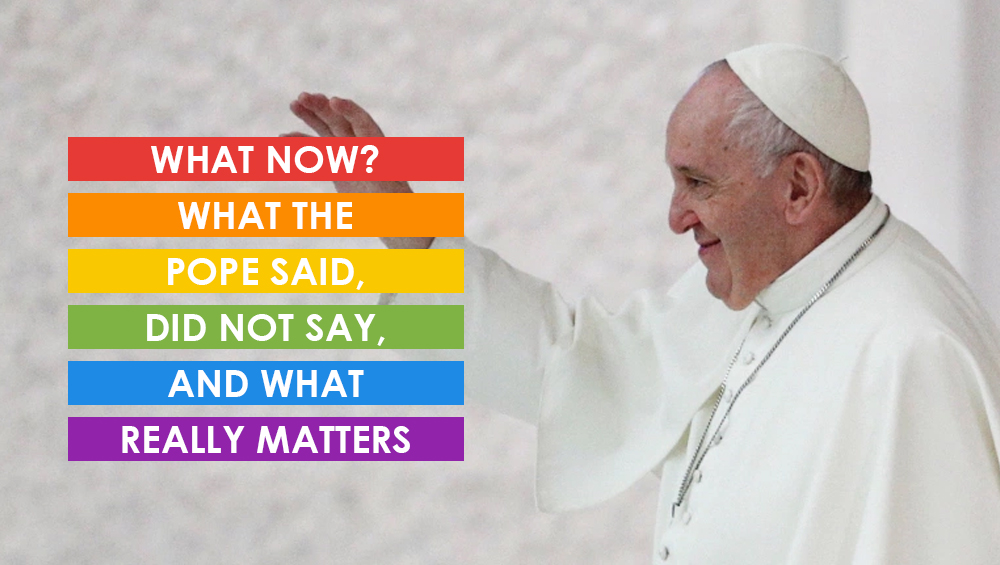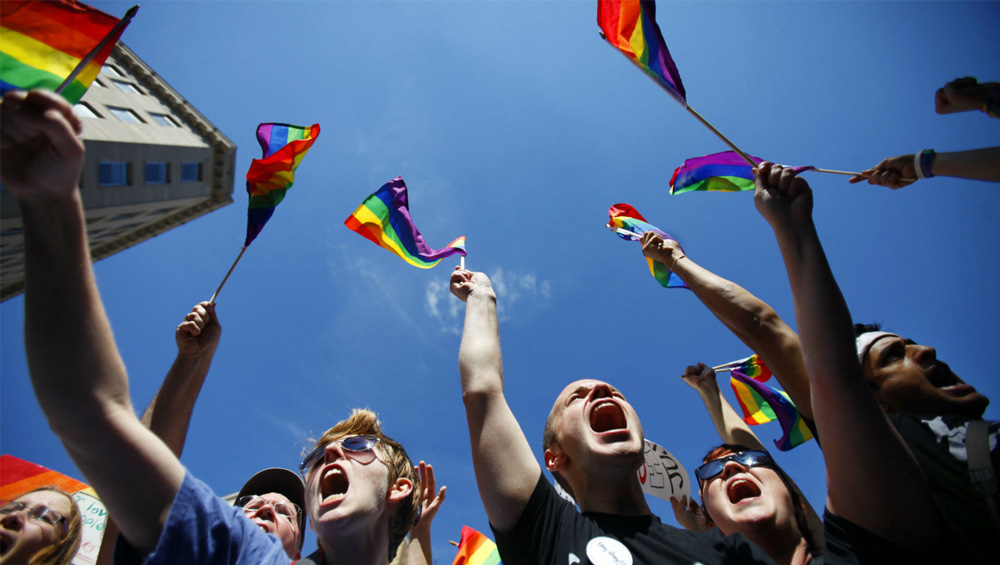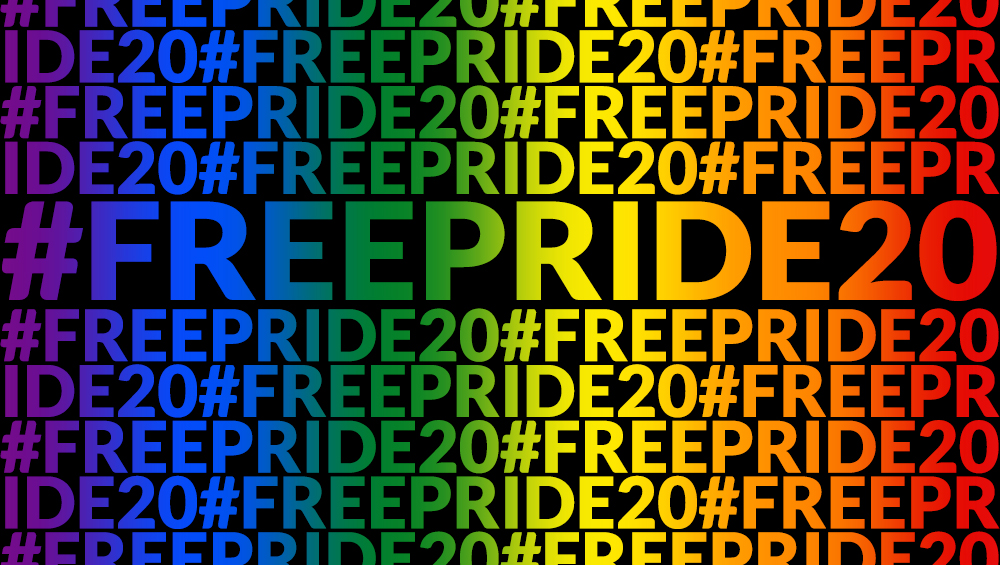By Reverend Joseph San Jose – Pastor of Open Table Metropolitan Community Church
Understanding Pope Francis and some of his controversial pronouncements require contextual knowledge and understanding of the history and doctrinal positions of the Roman Catholic Church. For something as old, complex, and wide-reaching as the Roman Catholic Church, there are a lot of nuances that need to be considered. While this may seem obvious, many people still misunderstand this Pope from Argentina.
Positive Statement With Certain Contexts
I want first to emphasize that for many people like me, the recent statement of Pope Francis regarding same-sex civil unions has a huge positive impact and far-reaching implications. Such a statement breaks away from the consistent and long-held negative language used by previous popes and many other Roman Catholic leaders. We have to take into consideration that, within the Roman Catholic Church, this statement of the Pope will send shockwaves to 1.3 billion Catholics around the world. But even more so for countries that are predominantly Roman Catholic and have negative attitudes towards LGBTQI+ individuals, like Poland. This pronouncement of the Vicar of Christ is a scathing contrast to the negatively loud language of the Polish Bishops against LGBTQI+ people. I hope that the Polish Bishops will rethink their language and approach towards LGBTQI+ persons after learning of this statement from the Pope. Although it is entirely possible also that they may double down and become even more virulent because of this statement of the current Bishop of Rome.
On the other hand, here in the Philippines, the CBCP has been firm with the Catholic Doctrinal position on homosexuality, same-sex relationships, and marriage, but it has not been as loud or virulent as their Polish counterparts. In my limited observation, the Philippine Roman Church has a more tolerant and pastoral approach overall, but it’s more on the emphasis that if LGBTQI+ people are not rocking the boat, then there is no reason for them to react or respond.
In countries where there are already marriage equality or civil unions for same-sex couples, this pronouncement of the Pope may prove to have very little significance or impact as it will be treated as moot and academic. Other people in those countries might even say that the pronouncement of Pope Francis is actually negative or counter-productive because, in countries that already recognize full marriage equality, a civil union is a regression or a step backward.
In the context of the Philippines, the pronouncement of the well-beloved Pope in support of legal civil unions for LGBTQI+ couples and families may have a far-reaching impact. In a country whose population is 80% Roman Catholic and where Sunday Masses before the pandemic were almost always packed with 4 to 6 masses within that same Sunday, the Pope’s pronouncement will certainly shake not only the CBCP but also every diocese, religious order, local parishes, and Catholic groups to rethink their approach towards LGBTQI+ persons and same-sex couples. They may, of course, choose to either follow the lead of the Pope or to grow even more antagonistic not only to the LGBTQI+ community but also towards the Pope. But more importantly, this fresh statement from Pope Francis will impact Catholic and other Christian parents to rethink or reconsider their positions or attitudes towards LGBTQI+ persons in general or to their very own children.
We cannot deny that, within the LGBTQI+ community, many are still devoutly Catholic or strongly Christian. Many gay men, lesbian women, transwomen, and other queer persons continue to have a strong affinity towards Catholic devotions or Christian worship services, even if it means doing it in the closet or in anonymity. Many LGBTQI+ Catholics have a strong devotion towards the Blessed Mother. Many other Christian youths and individuals continue to serve in various ministries of their churches. So the best positive impact of this pronouncement of the Pope relating to same-sex couples and civil unions would be towards LGBTQI+ Christians themselves. This may inspire some hope and encouragement to the group of people who have long been spoken of and spoken against by the Church as sexual deviants, or at worst, pathologically disordered.
Doctrinal Consistency And Papal Infallibility
There is so much misunderstanding and misconception about the authority of the Pope especially when he speaks in matters of doctrine and faith, as well as public life and policy. This stems from so much misconception and proper understanding of what people may refer to as the Infallibility of the Pope when speaking ex cathedra.
When the Pope speaks, does it mean everything that he says is infallible? This is the point of misunderstanding.
When the Pope speaks ex cathedra in matters of doctrine and faith, what the Pope speaks shall be held and accepted universally as dogmatically and doctrinally true and consequently imperative to the Catholic Christian life and spirituality. Ex-cathedra declarations or pronouncements are very rare because it has an absolute condition and universal application. If such declaration is found to be with error, it can be disastrous not only for any Pope, past and present, but also for the Vatican leadership. A future Pope or the doctrinal body may find it difficult to repudiate or defend what has been declared. Therefore, ex-cathedra declarations will always have a long and arduous process of assessment and review in many and different ways, but primarily by the Congregation for the Doctrine of the Faith (CDF), which was formerly known as the Holy Office of the Inquisition or Holy Inquisition. Then the official study will be referred to the Magisterium for further review and discussion. The Magisterium is composed of all the Roman Catholic bishops together with the Pope. The bishops of the world will be consulted to review the doctrine to be declared or to be changed. After much deliberation and with the final doctrinal subject having no strong opposition from other bishops and cleared of error, the Pope may then pronounce officially, ex cathedra, the doctrinal subject — the best example of which was the dogmatic declaration of the Assumption of Mary as an article of faith in 1950 by Pope Pius XII. Even non-ex-cathedra teachings and pronouncements of the Pope go through a similar process before being signed with the seal of Peter. The papal encyclicals, though not pronounced ex cathedral but also bear some weight of the Pope’s official teaching capacity, undergo a long study and review. Recently, some of the encyclicals of Pope Francis underwent a new process of consultation (synod) with bishops and lay experts before official declaration and publishing.
The statement of Pope Francis about civil unions was made through a documentary interview. The statement was not an official doctrinal pronouncement of the Pope. It was not spoken ex cathedra. It was not an official Vatican statement nor a statement from the Magisterium. It is not even a statement assessed and accented by the CDF.
Therefore, not everything that the Pope says has a doctrinal impact. The Pope does not and cannot speak infallibly in all matters.
But being the Pope, the religious leader of 1.3 Billion Catholics, even non-official and non-doctrinal statements may have far-reaching social and political ramifications.
Taking It As It Is, And Why Pope Francis “Supports” Civil Unions
In this way, there is no doctrinal change despite what the Pope said.
The Pope remains doctrinally consistent, and there is nothing that he has said so far that was outside of or a break from Roman Catholic doctrine, canon law, and theology.
Looking more closely at what the Pope actually said, Pope Francis’ support for civil union law for same-sex couples cannot be interpreted that the Pope has changed his mind about marriage both legally and more so sacramentally.
He is very clear that civil union is not the same as marriage. The Pope upholds the belief that the term, practice, and everything else associated with “marriage,” whether religious or secular, are only between one heterosexual cis-gender man and one heterosexual cis-gender woman. However, Jorge Cardinal Bergoglio, when he was still the archbishop of Buenos Aires, had to contend with the social reality of LGBTQI+ families and also had engaged with the push for legal recognition of same-sex relationships in Argentina. He then decided back then to make a distinction between marriage and relationships that he cannot consider for marriage but may be given some legal recognition by the state. Here, he then makes a compromise position of supporting civil union instead of legal marriage for same-sex couples. To a certain point, the current successor of Peter acknowledges the secular and social need to legally protect families he and his Church see as relationships outside the bounds of Roman Catholic Doctrine.
It is worth to say also that, for the LGBTQI+ community, a distinction between civil marriage and civil union is not what we seek. Nothing less than full marriage equality under state laws, which includes the terminology, is what should be accorded to LGBTQI+ people. Less will always be less and cannot be construed as equality.
Still Transphobic And Heteronormative
The statement pronounced in a documentary cannot be interpreted as entirely supportive of all LGBTQI+ persons. The statement is limited to support for civil unions for gay men, lesbian women, and perhaps bisexual individuals. The Pope remains opposed to transgender rights and calls transgender identities as mere gender ideologies. The Pope has consistently pronounced his adherence to the Roman Catholic position that the basis of gender is on biological sex. This, therefore, is a rejection and a denial of the lives and experiences of transgender individuals.
The support for civil union of same-sex couples can also be interpreted or safely presumed as support hinged on patriarchal and heteronormative concepts of family and relationships. The Christian imagination of what constitutes a family has long been transposed into LGBTQI+ relationships. There is a prevailing thinking that what is normative, acceptable, and worthy are those that resemble heterosexual monogamous relationships in the closest possible way. Therefore, other forms of mutually consensual adult relationships will never gain any form of support, recognition, or positive pronouncement from Pope Francis or the Roman Catholic Church in any and every context imaginable. Although, the vast majority of LGBTQI+ people never really needed or cared for such approval from any Pope or any Church even as we welcome any positive responses from them whenever they are given.
It Is Still Something We Can Welcome And Capitalize On
Knowing the history and context of the Roman Catholic Church regarding women and sexuality in general; Knowing the contrast between Pope Francis and his immediate predecessors; and within the various contexts I have mentioned above, we can still celebrate and welcome this statement of Pope Francis.
While the pronouncement changes nothing in the doctrine of the Church pertaining to marriage and sexuality, and consequently many areas of Catholic life and ministry, this is nonetheless what many called a departure from the attitude and language employed by the Roman Catholic Church and the two recent popes, Benedict XVI and John Paul II.
In 2003, the CDF still led by then Joseph Cardinal Ratzinger, who later became Pope Benedict XVI, issued a statement in response to countries legalizing marriage for same-sex couples. The official CDF statement reiterated strongly the Roman Catholic position in section I Article 4 that homosexual acts are “intrinsically disordered,” “homosexual inclinations are objectively disordered,”, and homosexual practices are “sins gravely contrary to chastity.” In the opening line of the concluding paragraph, Cardinal Ratzinger further states:
“The Church teaches that respect for homosexual persons cannot lead in any way to approval of homosexual behaviour or to legal recognition of homosexual unions.” [1]
The statement was then affirmed by Pope John Paul II on the 28th of March, 2003.
The position and the language it speaks are of course utterly reprehensible, intolerant despite a call to respect, and a rejection of what many academics and psychologists have studied and affirmed for decades — that homosexuality is not a disorder and is a natural variant of human sexuality.
Whenever asked about the reality, issues, and concerns of homosexual individuals, same-sex relationships, or LGBTQI+ people in general, the Vatican, individual Catholic bishops, or other Catholic leaders will almost always parrot this official doctrinal stand together with the strong language it uses. It doesn’t matter if it is a question on matters of civil rights or anti-discrimination legislation. Most leaders will not have the sensitivity that the Catechism or the CDF statement calls for. The leaders will often take and speak what is doctrinally safe for them, much to the detriment and pain of LGBTQI+ people.
Pope Francis, the current Vicar of Christ and successor of the apostle Peter, chose a more pastoral and sensible approach and language despite his doctrinal consistency. To a certain degree, he sees within a limited lens the struggles of LGB persons and families with LGB couples. He himself, unlike his predecessors, used the word “gay” instead of referring to LGB persons as “persons with homosexual inclinations” or “persons with homosexual preferences,” which are offensive terminologies to describe or refer to LGB individuals. He has received a gay couple in the Vatican Embassy during his visit to the United States in 2015. Pope Francis, through his papal almoner Cardinal Konrad Krajewsk, sent financial support to help a small community of transwomen sex workers who are struggling during this pandemic. There were other instances when the Pope received and welcomed LGBT persons in the Vatican or elsewhere.
And, in the clearest and plainest way, he now endorses civil unions for same-sex couples and calls for civil laws to protect same-sex families without breaking away from his Church’s doctrine.
With no other pope to ever speak in this way, he proclaims that:
“Homosexual people have a right to be in a family. They’re children of God and have a right to a family. Nobody should be thrown out or be made miserable over it.”
Anyone who has basic knowledge and familiarity with the Roman Catholic Church and its internal workings, they would certainly know that this recent statement of the Pope has far-reaching shockwaves throughout the Roman Catholic faithful and beyond. No one ever expected that we will ever hear such words or pronouncements from an incumbent pope within our lifetime. We never expected that a pope will be seen, photographed, or captured in videos receiving and talking with LGBT individuals or couples. It is often joked around with sarcasm that we have to wait 300 years or more for any significantly different statement to come out of any Pope or the Vatican. Many Catholic conservatives will scream to the highest heavens heresy and most likely pray even harder for the downfall or immediate death of Pope Francis. Other conservatives will scratch their heads, waiting for clarification from the Vatican. Conservative protestants and evangelicals may very well use this to further justify all their negative claims against the Pope and the Roman Catholic Church. Some progressives like myself celebrate and welcome this statement of the Pope while always remembering the complexity of Catholic nuances. And no matter how many analyses and explanations many experts, commentators, and religious leaders will say, the Pope’s recent statement will undoubtedly inspire and encourage many ordinary LGBTQI+ Christians around the world. In terms of the Philippine context, I will go so far as to say that the network of LGBTQI+ advocates and activists in our country can certainly capitalize on this statement of the Pope to push even more for our civil rights to be enacted into law.
As a 36 year old man who was raised Roman Catholic but who is now an ordained clergy (pastor) in the first Christian denomination, Metropolitan Community Church (c. 1968), which embraced and loudly proclaimed the sacred dignity and value of LGBTQI+ persons and their relationships by blessing them when no other Church did, I still welcome this statement of Pope Francis as a social step forward for the struggle for queer civil rights, yet with clear and realistic expectations that LGBTQI+ persons will remain invisible and second-class faithful in the Roman Catholic Church and many other Churches.
The Pope has spoken, eliciting so many reactions from various groups and peoples. The question is, what are we going to do about it as individuals and as an LGBTQI+ community?
While the statement may give us good vibes and hopeful feelings, the realization of justice and the attainment of equal rights inside and beyond our churches remain in our collective hands.
Not from Rome.
Not from any pope.
Nonetheless, thank you, Pope Francis.
Addendum: This statement of Rev. Joseph was written October 22, 2020 and posted in Facebook, evening of October 23, 2020, and on this blog post on October 24, 2020. In between, there are some people from within the Catholic Church who are claiming that there was a wrong translation from Spanish to English and perhaps the pope was misinterpreted. There are also innuendos that the interview of the Pope was edited to manipulate what the pope said or did not say. Both claims are not from the Vatican and as of the publishing of this post of Rev. Joseph, the Vatican nor Pope Francis hasn’t come out with an official clarification.



